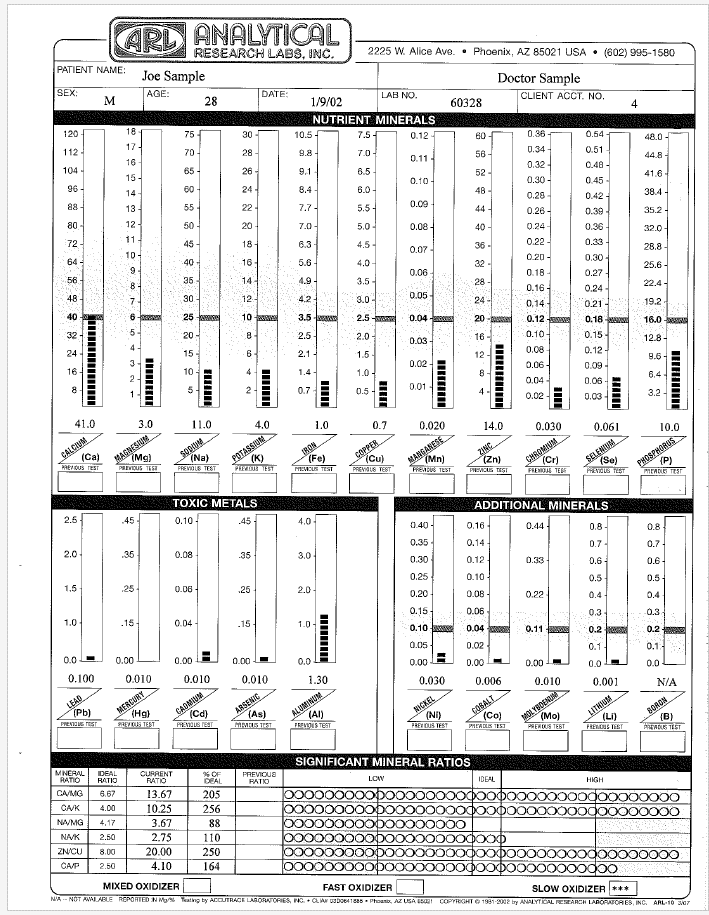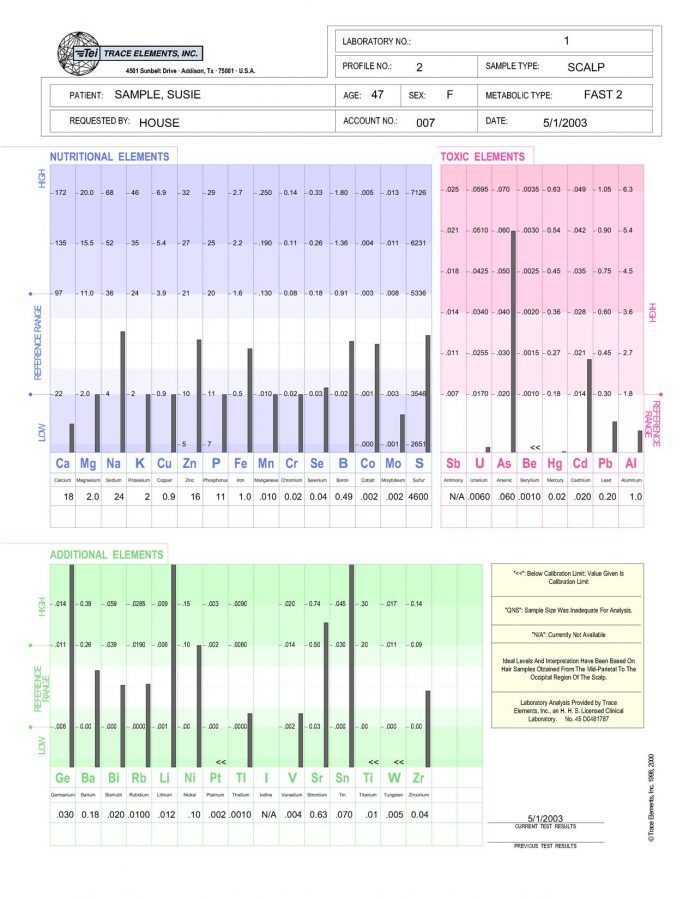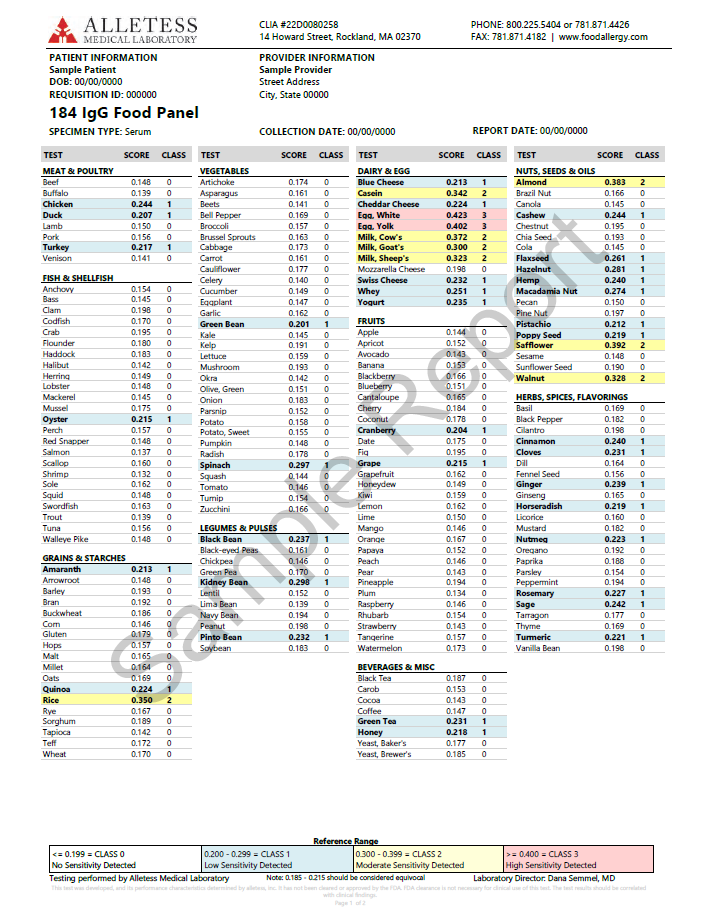
Table of Contents
Allergies
Allergies can exhibit themselves with some uncommon symptoms. Fatigue, joint aches, diarrhea, headaches, concentration issues, hyperactivity, and rashes are just some of the symptoms that allergies may cause. To help identify the many causes of allergies, a hair analysis that checks the oxidation rates can be very helpful. When an allergy is present, the body as a whole is out of balance, affected by various oxidation rates.
Toxic Load Threshold
Reducing the toxic load can be thought of as a person who is attacked by dust, mold, mites, pollens, toxic chemicals, food additives and other irritants. Reducing some of them all will reduce the toxic load or the critical stress threshold of the body. Indoor air pollution from dust, molds, dirty air ducts, and chemical exposure from furniture, carpets, office equipment and cleaning products is far worse than most outdoor pollution. Fortunately there are many items from air purifiers, ozone generators, purified water, natural substances for cleaning, and negative ionizers that can be attained to help reduce the pollution.
Chemicals found in foods, and foods to which one is sensitive, contribute to the toxic load. Improving food quality, eliminating problem foods and reducing one’s intake of chemical-laden foods can alone often make a huge difference in allergy cases.
Oxidation Rates
Effective strategies often involve addressing both the toxic load and the individual’s oxidation rates.
Oxidation rates, i.e., a slow or fast oxidizer, will help a person to understand how to approach and treat their allergies, bringing their body back into balance. Understanding oxidation rates can also provide insight into how different individuals react to allergens.
The relationship between oxidation rates and allergies is complex, as these rates can influence the severity of allergic reactions. Moreover, monitoring oxidation rates can help in tailoring treatments for individuals suffering from allergies.
A thorough understanding of oxidation rates can lead to more effective treatments, reducing toxic load and have better preventative measures for allergies.
Allergies in Slow Oxidizers
In a slow oxidizer the thyroid and adrenals are underactive. Chronic allergies are common in slow oxidizers. The adrenal hormones help to control allergic reactions, so an insufficient production of these hormones results in the body’s inability to respond adequately.
Fast oxidizers may experience different allergy patterns, which highlight the importance of understanding oxidation rates.
Also the slow oxidizer is prone to improper gut flora and can have an overgrowth of Candida Albicans in their gut. Along with vaginal yeast problems are constipation and sluggish elimination resulting in more toxic substances absorbed. Thus, the slow oxidizer is less able to eliminate toxins through the liver, kidneys, bowels and skin.
Allergies in Fast Oxidizers
Fast oxidizers often show different patterns in their oxidation rates which can affect their allergy responses.
Fast oxidizers often have more acute allergies such as severe IgE reactions to foods or a severe asthma attack. As a fast oxidizer you may have an excessive production of histamine, a chemical responsible for many allergic symptoms. Fast oxidizers tend to produce more adrenal hormones of epinephrine, norepinephrine, cortisol and cortisone, but reserves for emergencies may not be adequate.
Conclusively, focusing on oxidation rates can significantly enhance allergy management processes.
Understanding your oxidation rates can be a game changer in managing chronic allergy issues effectively.
Nutritional Correction for Allergies
Symptomatic remedies for slow oxidizers with allergies include nutrients that support the adrenal glands. These include vitamins A, C and E, manganese, Pantothenic acid and adrenal glandular substance. Higher than normal doses may be needed, at least initially to correct this.
High histamine individuals and fast oxidizers often need calcium, magnesium, zinc and other nutrients to reduce their sensitivity level. Bioflavonoids in high doses may help reduce capillary permeability. Selenium, a precursor to glutathione, may also be helpful for allergies.
In summary, paying attention to oxidation rates is crucial for anyone dealing with allergies.
When allergies are chronic, a more complete approach is better. This includes
- Environmental cleanup
- Lifestyle correction, including diet, rest and sleep
- Several months to several years on a corrective nutrition program and
- Other natural therapies as needed to correct longstanding adrenal weakness and other imbalances contributing to allergies.
Start your process to a healthier you, and to see if you are a fast or slow oxidizer, through a simple hair test from Analytical Research Lab or Trace Elements Lab.
FAQ’s about Allergies and Oxidation Rates
Why are allergies so bad right now in 2025?
Allergies are worse this year due to increased pollen levels caused by climate change and longer pollen seasons.
Do allergies cause oxidative stress?
Yes, allergies can contribute to oxidative stress.
Is it true that allergies change every 7 years?
Yes, it is often said that allergies can change every 7 years, but this varies by individual. Some people may develop new allergies or outgrow existing ones over time.
Are allergies increasing or decreasing?
Allergies are increasing.
Products
At Home Tests
-
←→

Analytical Research Labs Hair Test
$179.00$149.00Providing a mineral blueprint of one’s biochemistry, an Analytical Research Labs Hair Minerals Test reports levels of minerals and heavy metals in your body giving possible reasons for your symptoms, with suggestions for nutritional supplements and diet changes. Hair tissue mineral analysis can provide pertinent information about balanced nutrition, one’s metabolic rate, energy levels, sugar and carbohydrate tolerance, stage of stress, immune system and glandular activity.- Buy 2 at $145.00
Analytical Research Labs Hair Test
$179.00 $149.00Successfully Added to your Shopping CartAdding to Cart... -
←→

Trace Elements Nutritional Deficiencies Hair Test
Nutritional Tests, At Home Health Tests, Toxic Metals Tests, Hair Tests, Autism Tests, Immune System Tests$188.00 $148.00Successfully Added to your Shopping CartAdding to Cart... -
←→

UCARI Intolerance Test Kit
$99.99$88.00Test for 1500+ possible intolerances and nutritional imbalances- Buy 2 at $85.00
UCARI Intolerance Test Kit
At Home Health Tests, Hair Tests, Allergy Tests, Nutritional Tests, Environmental Pollutants Tests, Mycotoxin Molds Tests, Allergy Solutions, Lung Solutions, Gastrointestinal Solutions, Immune System Tests, Candida Solutions$99.99 $88.00Successfully Added to your Shopping CartAdding to Cart... -
←→

Alletess Food Allergy Sensitivity Test
$269.00$223.00Food sensitivities may be causing many of your health issues. Test now with this convenient at home test; no lab visit required.Alletess Food Allergy Sensitivity Test
At Home Health Tests, Allergy Tests, Blood Spot Tests, Allergy Solutions, Lung Solutions, Gastrointestinal Solutions$269.00 $223.00Successfully Added to your Shopping CartAdding to Cart...
Supplements
References
- https://doi.org/10.1542/peds.2011-2196
- https://doi.org/10.1164/rccm.200906-0858OC
- https://doi.org/10.1164/rccm.200701-036OC
- https://doi.org/10.1038/nature07204

Your writing is incredibly inspiring. You have a knack for sparking curiosity and encouraging critical thinking.
Thank you for being such a positive influence!